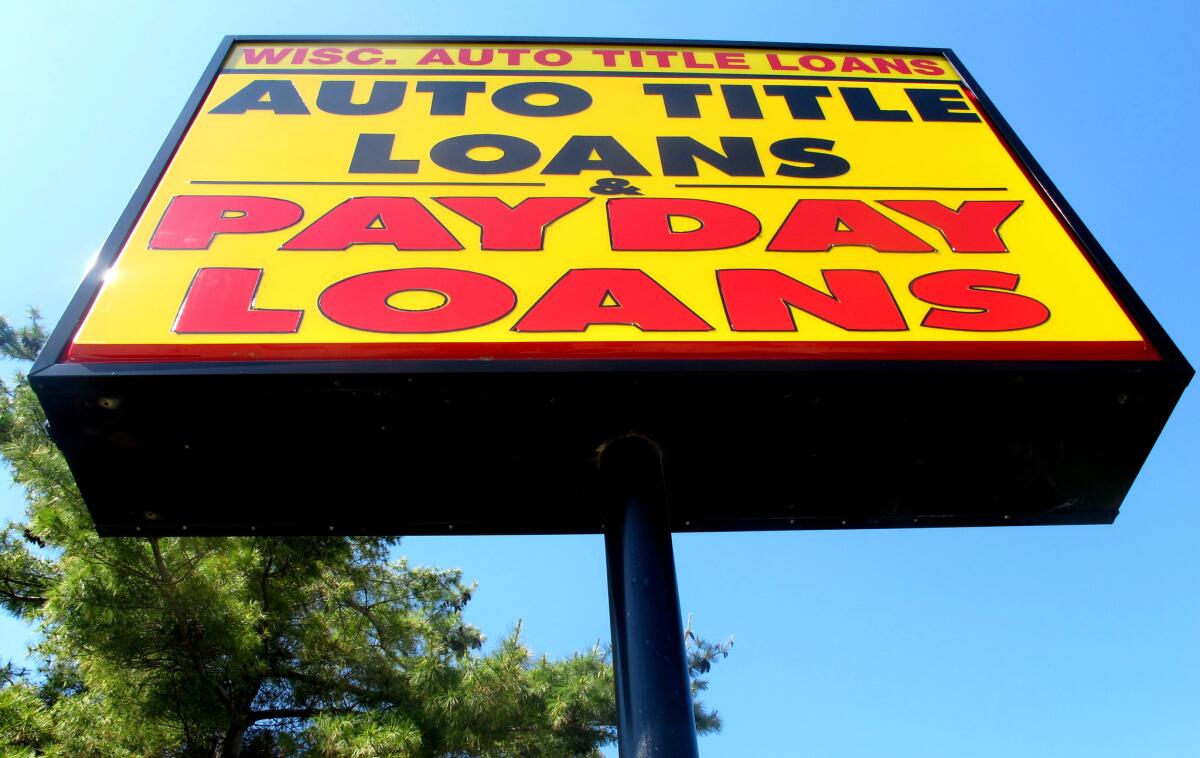Can you afford that payday loan? Feds say lenders should ask

The Consumer Financial Protection Bureau will release a set of sweeping proposals Thursday aimed at reshaping the market for payday loans and other types of expensive credit that both the agency and consumer advocates call “debt traps.”
The proposed regulations, set to be released in advance of a Kansas City, Mo., hearing, come after years of preparation by the bureau, which has since 2013 released several reports critical of the payday-lending industry.
The rules would limit the number of payday loans a consumer can take out each year, change how lenders collect payments and require them to do a more thorough review of borrowers’ finances to make sure they can afford to repay their loans.
Though consumer advocacy groups back parts of the proposal, some are concerned the rules don’t go far enough, leaving ample opportunity for consumers to still get bad deals. Lenders, meanwhile, are chafing at the proposal, which they say will add to their costs and make it unprofitable to make loans to many consumers.
In remarks prepared for Thursday’s hearing, CFPB Director Richard Cordray said lenders too often make loans knowing that borrowers will not be able to pay them off, locking them into a cycle of debt.
“If a lender can succeed when borrowers are set up to fail, it is a telltale sign of a malfunctioning market,” he said. “When the balance between lenders and borrowers is knocked askew, the ‘win-win’ dynamic found in healthy credit markets disappears and puts consumers at great risk.”
At the heart of the proposal is a requirement that lenders determine that a borrower has the ability to repay. That means lenders will have to look at a borrower’s income and subtract bills, rent and other living expenses to determine whether there’s enough left over to afford loan payments.
The bureau wants to ensure borrowers won’t pay off a payday loan, then find that they don’t have enough money to make other payments, forcing them to take out another loan – the kind of “debt trap” it is trying to end.
The CFPB has already required mortgage lenders to determine borrowers’ ability to repay when they apply for mortgages, but lenders making small loans, usually for just a few hundred dollars, typically don’t do such a detailed analysis.
California borrowers who walk into an Advance America payday loan branch, for instance, can walk away with a $255 loan after just 15 or 20 minutes, said company spokesman Jamie Fulmer. To spend much more time than that on such a small loan, he said, doesn’t make sense.
“Going through an arduous, detailed analysis of take-home pay and household spending for a $255 loan is onerous,” Fulmer said. “It would add time to the process, expense to the process and complexity to the process, none of which is good for consumers.”
The Consumer Bankers Assn., a trade group made up mostly of banks, not payday lenders, agreed, saying in a report that the CFPB’s proposed underwriting requirements are “as comprehensive and rigorous for a $500 small-dollar loan as the underwriting for a $500,000 mortgage.”
Kris Kully, an attorney in the consumer financial services practice of law firm Mayer Brown, said the underwriting requirements would naturally prevent some consumers from getting loans. What’s not clear, she said, is what those consumers might do instead.
“I’m not sure exactly what the alternative will be,” she said. “The CFPB finds some consumers who take out these loans end up worse off. But I’m not sure what the agency would have the borrowers do instead.”
Rebecca Borné, senior policy counsel at the advocacy group Center for Responsible Lending, which is generally supportive of the CFPB’s proposal but has pushed for stricter rules, said some consumers who cannot meet the new requirements will turn to other, less harmful forms of borrowing.
That includes pawn shops and loans from friends and family members – alternatives, she said, that many payday loan borrowers end up turning to at some point anyway to pay off their high-interest loans.
The CFPB’s proposal offers lenders a few ways around the ability-to-repay rules. For instance, they don’t have to do a full analysis if they limit the number of times a borrower can refinance the loan and meet other requirements.
But the limitations would not prevent borrowers who are unable to get additional payday loans from taking out other types of high-cost debt, including installment loans, which often carry triple-digit interest rates and are repaid over years rather than weeks, said Alex Horowitz, a researcher at the nonprofit Pew Charitable Trusts.
The CFPB’s proposed ability-to-repay rules would also apply to installment lenders, but because they issue loans that are repaid over longer terms, individual payments can be smaller – and thus appear more affordable, even though borrowers often end up paying more in interest than they borrowed in the first place.
“We’re going to see loan terms stretch out, but we’re not likely to see prices come down,” Horowitz said. “The reason this proposal misses the mark is that it shifts the market to longer terms but not lower cost.”
The bureau will take public comments on the proposed rules until September. The rules could take effect in about a year.







